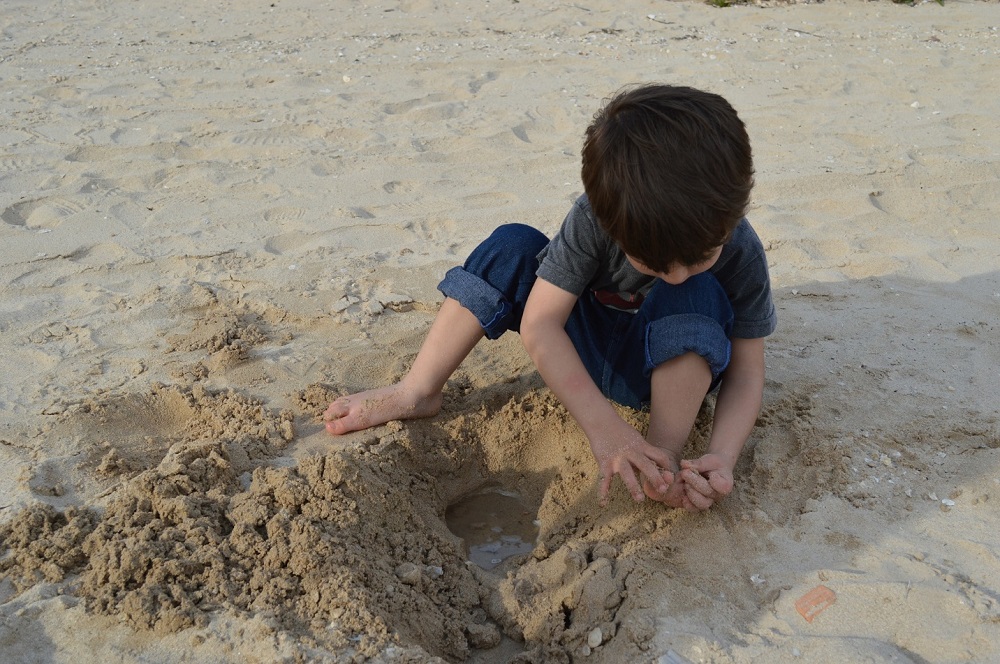Why Early Learning
Maria Montessori believed that children learn best when they are allowed to use their natural curiosity. We often underestimate their creativity, imagination and intelligence. But if we observe them closely, we will realize that they are more than capable. Their mind is like an absorbent sponge ready to learn and explore what they want to (and not what we want to teach them!).
Don’t get overwhelmed with the term “Early Learning”. You can call it “Play-based learning”, you can call it “explorative play” or “heuristic play”, or any other term that you are more comfortable with 🙂 But in fact, as Dr. Maria Montessori puts, “Play is the work of the child.” For them it is serious work. It is one of the most important element of their existence.
Every child wants an opportunity to explore, not to kill time but to involve himself productively in it. The child desires to learn at every single opportunity that the life throws at him. Learning is a natural instinct of a child. You can call this work, you can call this play. But a child naturally has an inquisitive, curious mind.


It is amazing how a 2 year old pays no attention to the blazing musical toy, but will attentively focus on its cardboard packaging instead. He will try to study it, play with the bubble wrap and might even try to tear it. This is his natural curiosity. When we observe the child closely, he will give us enough clues and cues. And if we follow even a few of them, we will be able to provide an environment where a child can nurture and bloom.
So what can we as parents / caregivers / teachers do? We can be there when they need us. Not as an authoritative dictator, but a gentle and mindful facilitator. We need to believe in their strengths. We need to trust them, have faith in them, and most importantly be patient with them. We can provide them a “prepared environment” which helps them to explore and love their independence.
Benefits of early learning and Montessori works:
- Enriched childhood – Children love play, be it through books, nature or exploration. Needless to say, 0-6 years form a foundation for the child!
- Fine motor skill development: Our tiny tots probably do not need lot of encouragement when it comes to using gross motor skills (viz. walking, jumping, swaying etc!). But it’s equally important that kids work on their fine motor skills which are the small, precise thumb, finger, hand, and wrist movements — because they support a host of other vital physical and mental skills.
- Creative outlet to harness their “super-energies”! It also improves child’s problem solving skills, encouraging his “reasoning abilities”.
- Boredom buster: Children get so easily bored with their set of toys. Yes toy rotation is helpful, but children need some “outlet” (besides their toys, nature, outings, play dates etc) to keep themselves occupied, especially whilst at home. If they do not get this outlet (or rather if we do not provide them with such an outlet) they very conveniently find solace / happiness in screen-time, be it TV, I pad etc. Montessori works and creative play activities is a fantastic way to keep a toddler engaged and happy! Some of the quiet time activities are great to keep them engaged whilst you finish your house-chores.
- Creative play widens their imagination compared to the electrical gadgets. It allows the child to explore and try on their own “new” activities, and get familiar with new objects / materials. I am not against TV or I pad. But I do not use it as a means to keep my son “busy” or “entertained”. Simply because I pad / Computer provokes passive perception of imagination (meaning, “I am sitting…entertain me!”). Screen time offers very limited source of sensory experience.
Checklist for Montessori shelf works
- Decide a small space at home where you can arrange the Montessori / Montessori-inspired shelf. If space is an issue, you can do this in any small corner of your home. Or use your TV cabinet / one area of book shelf for this purpose.
- Set up a mat or a table and chair where your child can enjoy the activity.
- Set each activity in a tray or basket. That way you segregate each activity. Child understands that he needs to finish one activity at a time, before moving onto the next one.
- Focus on interest level of the child, rather than the completion of activities. Do not push the child to do an activity. If he isn’t interested in one activity, let him go onto the next one. Listen to your child’s cues and plan the next activities accordingly.
- Keep a bank of activities ready for your child. You can rotate the activities / toys as and when the child starts losing interest and is wanting to explore a new activity.
- Keep the shelf, play room & toys well organized. Involve your child in tidying up the shelf and toys.
- Encourage imaginative play rather than a structured sequence.
- Introduce natural elements in shelf work wherever possible viz. wooden toys, sensorial bins, natural material, botanicals etc
- Shop for materials from online stores / stationary shops / super markets etc where you get cheap deals. Do not spend a lot to create these activities. Make do with what you have at home.
Check this video on how to set up a Montessori shelf on a budget at home:
For activity ideas, you can subscribe to my YouTube channel where I post a new video every week!




